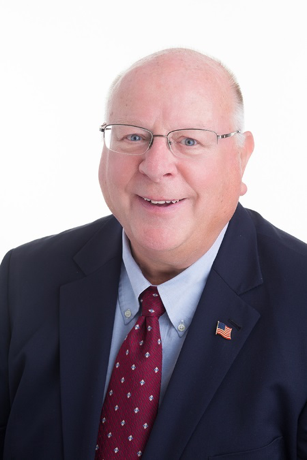CenterStage...Open Season for Open Enrollment
In this month’s CenterStage, we interviewed Rich Arnold for some in-depth information on Medicare plans and health coverage. Read the full article below.

Open Season for Open Enrollment: What does it mean for you?
There are 10,000 people turning 65 every single day. Medicare has a lot of options, causing the process to be extremely confusing. Rich – a Senior Solutions Advisor – works hard to provide you with the various options available to seniors in Ohio, Kentucky and Indiana and reduce them to an ideal, simple, and easy-to-follow plan.

“For me, this is all about helping people.”
– Rich Arnold, Senior Solutions Advisor
What does this call for?
To provide clients with top-notch Medicare guidance, Rich must analyze their current doctors and drugs for the best plan option and properly educate them to choose the best program for their situation and health. It’s a simple, free process of evaluation, education, and enrollment.
For this month’s CenterStage article, we asked Rich to break down Medicare for the senior population who are in desperate need of a break from the confusion.
Medicare Break Down
Part A. Hospitalization, Skilled Nursing, etc.
If you’ve worked for 40 quarters, you automatically obtain Part A coverage.
Part B. Medical Services: Doctors, Surgeries, Outpatient visits, etc.…
You must enroll and pay a monthly premium.
Part C. Medicare Advantage Plans:
Provides most of your hospital and medical expenses.
Part D.
Prescription drug plans available with Medicare.
Under Parts A & B there are two types of plans…
Supplement Plan or Medigap Plan
A Medicare Supplement Insurance (Medigap) policy can help pay some of the health care costs that Original Medicare doesn’t cover, like copayments, coinsurance, and deductibles, coverage anywhere in the US as well as travel outside of the country, pay a monthly amount, and usually coupled with a prescription drug plan.
Advantage Plan
A type of Medicare health plan that contracts with Medicare to provide you with all your Part A and Part B benefits generally through a HMO or PPO, pay a monthly amount from $0 and up, covers emergency services, and offers prescription drug plans.
How does this effect you?
Medicare starts at 65 years of age, but Rich advises anyone turning 63 or 64 years of age to reach out to an advisor, such as himself, for zero cost, to be put onto their calendar to follow up at the proper time to investigate the Medicare options. Some confusion exists about Medicare and Social Security which are separate entities. Social Security does not pay for the Supplement or Advantage plans.
Medicare Open Enrollment: Open Enrollment occurs between October 15th and December 7 – yes, right around the corner! However, don’t panic, Rich and his services can help you if you are turning 65 or if you haven’t reviewed your current plan in over a year – you should seek his guidance.
Your plan needs to be reviewed every year to best fit your needs. If you’re on the verge of 65, turning 65 in the next few months, or over 65, you should consult your Medicare advisor as soon as possible. For a no cost analysis of your needs contact Rich, Saxon Senior Solutions Advisor, rarnold@gosaxon.com, 513-808-4879.
4 calls for medical help from employees
Originally posted on https://ebn.benefitnews.com
The Grand Rounds’ recent Employee Benefit Expectation survey, the results of which were announced Wednesday, emphasizes the high value employees place on medical plans that can extended to newer shapes of families – same-sex couples, aging parents and medical dependents much older than 21. "The modern employee," the survey reads, "is looking for employers that recognize the changing state of familial responsibilities."
Access to medical opinions and expert advice is very important to today’s employees – rated more desirable than free annual flu shots. Here are four things workers crave out of medical coverage and information, and how employers can benefit from meeting those needs.
More than one in four (28%) employees tell Grand Rounds they wouldn't know how to find a qualified medical specialist for a serious illness affecting them or a loved one, and 35% say they would pay $5,000 or more for the world’s leading specialist to review their own or a loved one’s case. “Today’s employee is hungry for better access,” Grand Rounds says.
Some 60% of respondents would be more likely to stay with their employer if free access to expert medical opinions was offered, versus only traditional health insurance. Additionally, when choosing between multiple employment offers, 68% say they would be more likely to select a position that includes free access to expert medical opinions that extends to their family.
"There is a real talent war going on in this country, especially here in Silicon Valley,” says Rick Foreman, CFO and VP of business operations for Wealthfront, a Grand Rounds client. “This means that recruiting and retaining top-notch talent no longer means providing weekly happy hours or a Ping-Pong table. It’s about adding real value to our employees' lives."
As part of the so-called Sandwich Generation, 47% of adults in their 40s and 50s have a parent aged 65 or older and are either raising a young child or financially supporting a grown child, according to the Pew Research Center. Increasingly, employees want help with their older family members: 60% of employees with living parents tell Grand Rounds that it's important health care benefits extend to them. “As employees widen their definition of family, they expect employers to do the same,” Ground Rounds says.
A whopping 89% of those surveyed say they would travel to receive a second opinion from a medical expert on a disease or condition. More than a third (35%) would go anywhere in the United States, and 22% say they would travel anywhere in the world – such is the extent of their desire for the best possible medical help.

